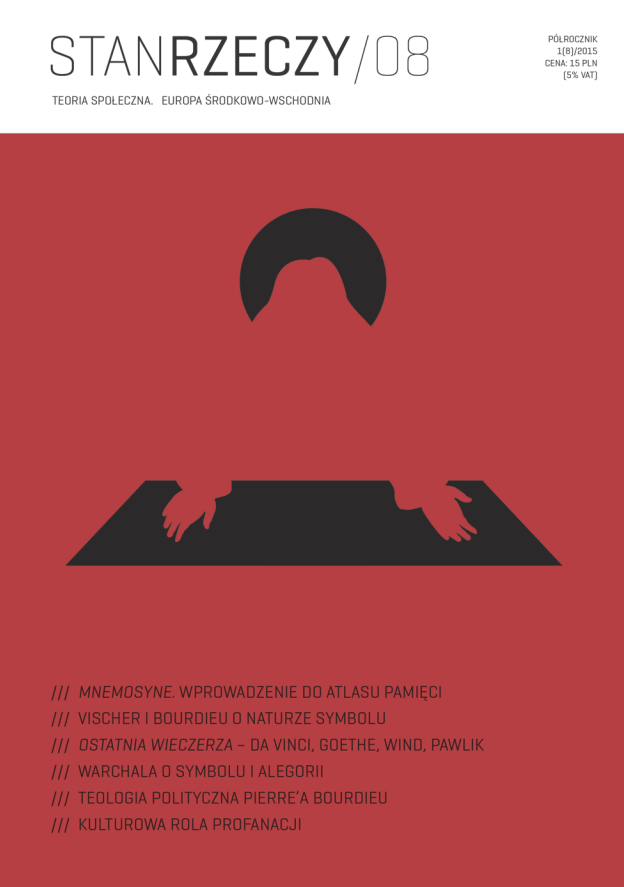Chrześcijanin bez Boga. Teologia polityczna Pierre’a Bourdieu
A Christian without God: The Political Theology of Pierre Bourdieu
Author(s): Michał ŁuczewskiSubject(s): Christian Theology and Religion, Philosophy, Social Sciences, Sociology, Theology and Religion
Published by: Wydział Socjologii Uniwersytetu Warszawskiego
Keywords: social theory; political theology; Bourdieu; Kantorowicz; Kafka; Pascal; Schmitt; Jonas
Summary/Abstract: Pierre Bourdieu jest teologiem, teologiem politycznym. Jednymz najważniejszych źródeł (choć ukrytym) myśli autora Reprodukcji jestklasyczne dzieło Ernsta Kantorowicza Dwa ciała króla. Studium ze średniowiecznej teologii politycznej. Konstruując jedną z najbardziej wpływowychteorii społecznych XX wieku, francuski badacz czerpie pełnymi garściamiz religijnych metafor i pojęć. Stanowią one nie tyle retoryczny ornament,lecz także istotę jego myśli. Należy poważnie potraktować deklaracjęBourdieu, że jest uczniem Pascala, „pascalianinem” ( pascalien).Istnieje bowiem głęboka racja, że antyklerykał i ateista opowiada się zanajwiększym apologetą chrześcijaństwa. Otóż podziela on wizję Pascalaz jednym ważnym zastrzeżeniem. Deus absconditus Pascala, który ma nasuwolnić od nędzy świata, zostaje zakwestionowany, a cechy Boga jakowszechmocnego stwórcy i prawodawcy przechodzą na Państwo i naukę.W ten sposób Państwo zaczyna przypominać demiurga, Boga zła. PonieważBourdieu nie wierzy w religijne drogi emancypacji spod władzy Państwa, emancypacja jako taka staje pod znakiem zapytania. Francuskisocjolog znajduje jednak dwie wysoce ryzykowne drogi wyjścia: wiedzęi miłość. Emancypacja rozpoczyna się od wycofania się ze świata – odzmiany samego siebie, która jest warunkiem wszystkich zmian. Przez pokorę i ascezę wiedzie droga do konwersji naukowej, poprzez praktykiantynomijne wiedzie droga miłości. Odpowiada to dwóm wersjomgnostycyzmu: ascetycznej i libertyńskiej. W końcu jednak sam Bourdieuulega sile Państwa i paradoksalnie staje po stronie Carla Schmitta. Pierre Bourdieu is a theologian, a political theologian. One of the important,but hidden, source of his work is the classic work The King’s TwoBodies: A Study in Mediaeval Political Theolog y. While constructing one of themost influential social theories of the 20th century the French scholardraws handfuls of religious metaphors and concepts. These are not merelyrhetorical ornaments; they are the essence of his thinking. We ought totreat seriously Bourdieu’s declaration that he is a Pascalian. There is a profoundreason why the anti-cleric and atheist declares himself in favor of thegreatest Christian apologist. This is because he shares Pascal’s vision withone important reservation. The Deus absconditus of Pascal, who is supposedto free us from the wretchedness of the world, is challenged while the qualitiesof God as the omnipotent creator and lawgiver are transferred to theState and science. In this way the State becomes reminiscent of the Gnosticdemiurge, an evil God. Since Bourdieu does not believe in religious pathsof emancipation from the power of the State, emancipation in itself becomequestionable. However, the French sociologist finds two risky waysout: knowledge and love. Emancipation begins with a withdrawal from theworld, from changing oneself, which is the pre-condition for all changes.Humility and ascesis lead one along the path toward scientific conversion;the path of love leads through antinomic practices. This corresponds totwo versions of Gnosticism: ascetic and libertine. In the end Bourdieuhimself succumbed to the power of the State and paradoxically ended upon the same side as Carl Schmitt.
Journal: Stan Rzeczy
- Issue Year: 2015
- Issue No: 8
- Page Range: 194-227
- Page Count: 34
- Language: Polish

